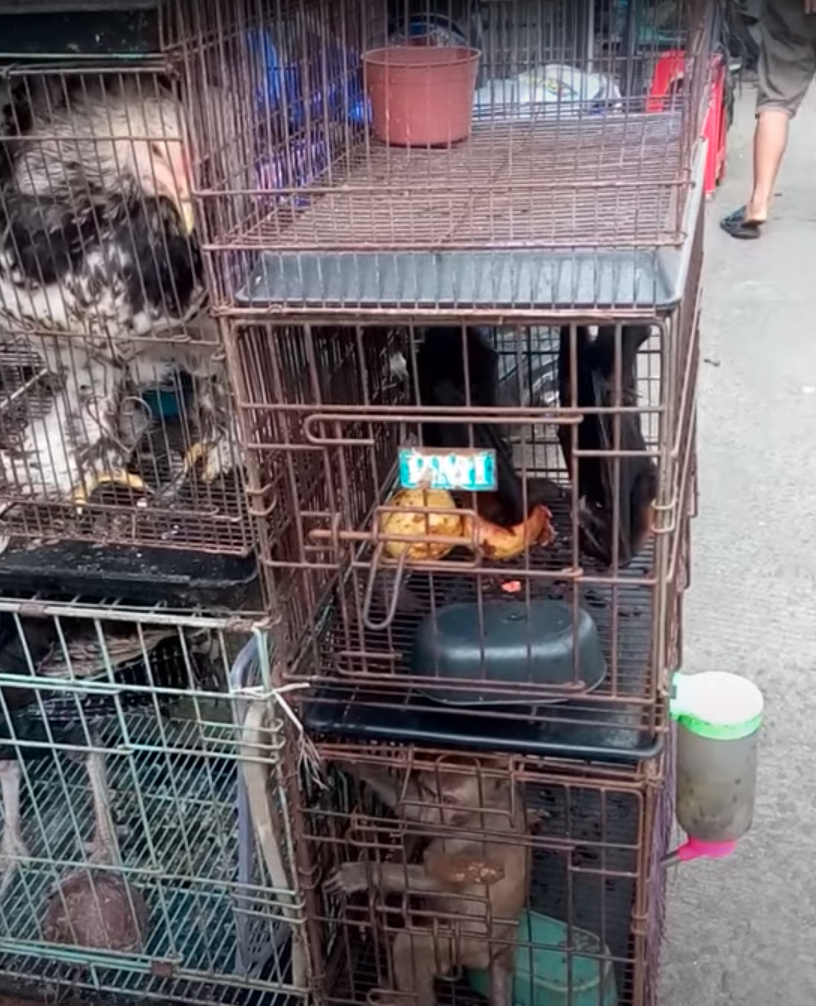Shocking footage from inside reopened wet markets
WARNING – DISTRESSING CONTENT: Disturbing footage has emerged of live-animal wet markets full of dogs, bats, monkeys and snakes still operating in some Asian countries amid the coronavirus pandemic.
Animal rights organisation PETA Asia released the video as part of a call to the World Health Organisation to close the live-animal markets worldwide, including ones operating in the US.
It is believed the coronavirus, which has killed more than 300,000 people and infected more than four million, originated at a wet market in Wuhan, China.
PETA claims amid the pandemic, wet markets are still operating in China, Indonesia, Vietnam, Cambodia, the Philippines and Thailand.

The distressing video shows live civets, which have been linked to SARS, and bats, linked to the coronavirus, in cages as they are being sold in Indonesia.
Cats, monkeys and birds are also seen caged up in the footage with rotten food and faeces.
PETA claims at the wet markets in Vietnam, cooked heads and body parts of dogs are piled up on a counter, while at wet markets in the Philippines workers are seen standing on blood-soaked floors as they cut up pig and bird carcasses with their bare hands.
“The next deadly pandemic is inevitable as long as markets filled with sick and stressed animals are still open,” PETA President Ingrid Newkirk said in a statement.
“PETA is calling on government officials to shut down these petri dishes for pandemics.”

Signs now at a large food market in Wuhan forbid the selling of wild animals and live fowl.
China’s wet markets have been slammed internationally as the coronavirus roils the world, with the disease having seemingly emerged from stalls selling live game in Wuhan late last year.
The government has since banned the sale of wildlife for food, but the reopening of markets has drawn criticism from around the world as the death toll from the pandemic continues to mount.
Shut down during the lengthy quarantine that sealed off Wuhan until April 8, the city's markets are now fighting for survival as customers have not been rushing back.
"There's no question, we're doomed this year," spice seller Yang, who runs a stall at the massive Baishazhou wholesale market, told AFP.
"There have never been so few people at our market."
Yang, whose sales have fallen by a third from before the lockdown, dismissed criticism of markets as virus hotbeds as "unnecessary panic".
One market remains closed: The Huanan Seafood Market that sold a range of exotic wildlife and is suspected to be the cradle of the virus that jumped from animals to humans.
Wet markets are popular venues to buy fresh meat, vegetables and fish across Asia – most selling common, everyday produce to locals at affordable prices.
Most don't sell live animals, although some do.
During visits to three Wuhan markets last month, AFP news agency saw live turtles, frogs, fish and crustaceans for sale, but no fowl or mammals blamed for past diseases.
With AFP
Do you have a story tip? Email: newsroomau@yahoonews.com.
You can also follow us on Facebook, Instagram and Twitter and download the Yahoo News app from the App Store or Google Play.





